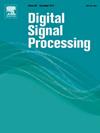Monotonically accelerated proximal gradient for nonnegative tensor decomposition
IF 2.9
3区 工程技术
Q2 ENGINEERING, ELECTRICAL & ELECTRONIC
引用次数: 0
Abstract
Efficient tensor decomposition requires stable and convergent optimization algorithms. The accelerated proximal gradient (APG) is a workhorse algorithm for nonnegative tensor decomposition. For large-scale tensors, APG is always implemented to optimize the subproblems in the block coordinate descent framework. However, APG cannot guarantee monotonic convergence in the optimization process. In this paper, we develop monotonically accelerated algorithms to improve the efficiency of tensor decomposition. We propose four criteria to monitor the convergence state in the subproblem. Based on each criterion, we propose monotonic convergence rules for the subproblem. We evaluate the monotonically accelerated algorithms via six experiments covering a wide range of types of tensors. The experimental results demonstrate that our proposed algorithms with monotonic convergence monitoring have significant acceleration effects and high precision compared with those without monitoring. After the experiments, we present the selection rule of the monotonic monitoring criterion for different types of tensors.
求助全文
约1分钟内获得全文
求助全文
来源期刊

Digital Signal Processing
工程技术-工程:电子与电气
CiteScore
5.30
自引率
17.20%
发文量
435
审稿时长
66 days
期刊介绍:
Digital Signal Processing: A Review Journal is one of the oldest and most established journals in the field of signal processing yet it aims to be the most innovative. The Journal invites top quality research articles at the frontiers of research in all aspects of signal processing. Our objective is to provide a platform for the publication of ground-breaking research in signal processing with both academic and industrial appeal.
The journal has a special emphasis on statistical signal processing methodology such as Bayesian signal processing, and encourages articles on emerging applications of signal processing such as:
• big data• machine learning• internet of things• information security• systems biology and computational biology,• financial time series analysis,• autonomous vehicles,• quantum computing,• neuromorphic engineering,• human-computer interaction and intelligent user interfaces,• environmental signal processing,• geophysical signal processing including seismic signal processing,• chemioinformatics and bioinformatics,• audio, visual and performance arts,• disaster management and prevention,• renewable energy,
 求助内容:
求助内容: 应助结果提醒方式:
应助结果提醒方式:


